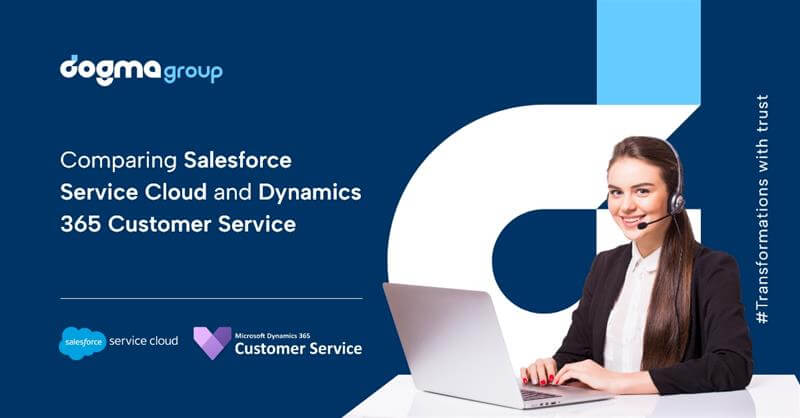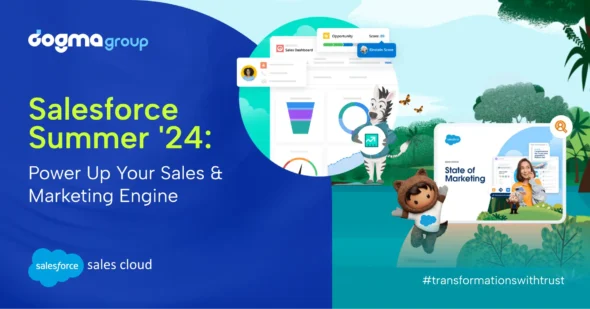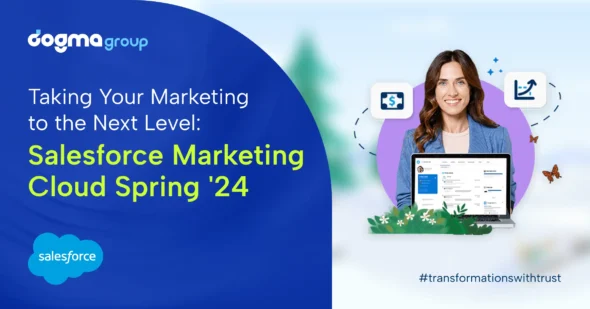In the hyper-connected world that we live in, demand for exceptional customer experiences is rapidly increasing. Customers not only have higher expectations but can also easily access multiple vendors using multiple channels. That makes delivery of excellent customer service and customer experience not only critical for organisational success but also challenging—perhaps now more than ever!
So, more and more organisations are now turning towards customer service management solutions, which are customer relationship Management (CRM) systems focusing on managing customer interactions. And two of the most popular customer service platforms are Microsoft Dynamics 365 Customer Service and Salesforce Service Cloud.
But it’s always tricky to definitively tell which is the best among the two. So, here is a detailed comparison between Service Cloud and Customer Service to help you narrow down your choice.
1. Platform
Let’s start with the platform. Both Salesforce Service Cloud and Dynamics 365 Customer Service are cloud-based solutions that focus on managing customer service and interactions. As such, both systems help businesses by handling case and account management, streamlining customer interactions, and ensuring faster service and support delivery.
That said, Salesforce is fundamentally a CRM platform with a higher focus on managing customer relationships. So, many of its business applications are CRM-centric that tend to have limited extensibility to ERP and HRM functions. These applications are part of Salesforce Customer 360 bundle that includes Sales Cloud, Service Cloud, and Marketing Cloud. That implies Service Cloud is a standalone application which can connect with other standalone ERPs since Salesforce does not offer its own ERP solution.
On the contrary, Dynamics 365 is a more versatile platform that also covers other areas, like ERP and HRM, with its larger range of intelligent business solutions. For customer-facing processes, it has Sales, Customer Service, Retail, Project Service Automation, Field Service, Microsoft Social Engagement and Microsoft Relationship Sales. Working alongside these are Microsoft’s enterprise resource planning solutions, like Marketing, Commerce, Business Central, and Finance and Operations. Plus, there is a Human Resources module, too. Additionally, Microsoft has its own suite of office applications like Office 365 (now Microsoft 365) and OneDrive; collaborative solutions like SharePoint and Outlook; and a low-code development platform Power Automate.
That means Dynamics 365 offers a bit more flexibility and scalability than Salesforce in the long run. All these solutions provide Dynamics 365 more range and better ability to deliver digital imperative for modern businesses, and part of this broader process is its Customer Service application. So, although Dynamics 365 Customer Service can be implemented as a standalone application, it is often bundled with other applications in Microsoft’s Customer Engagement Plan.
2. Functionality
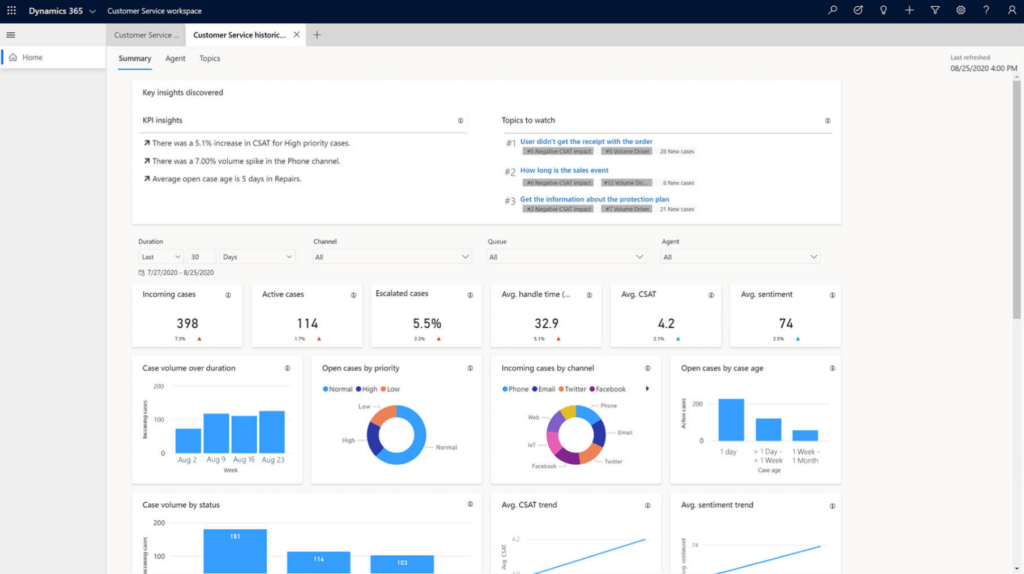
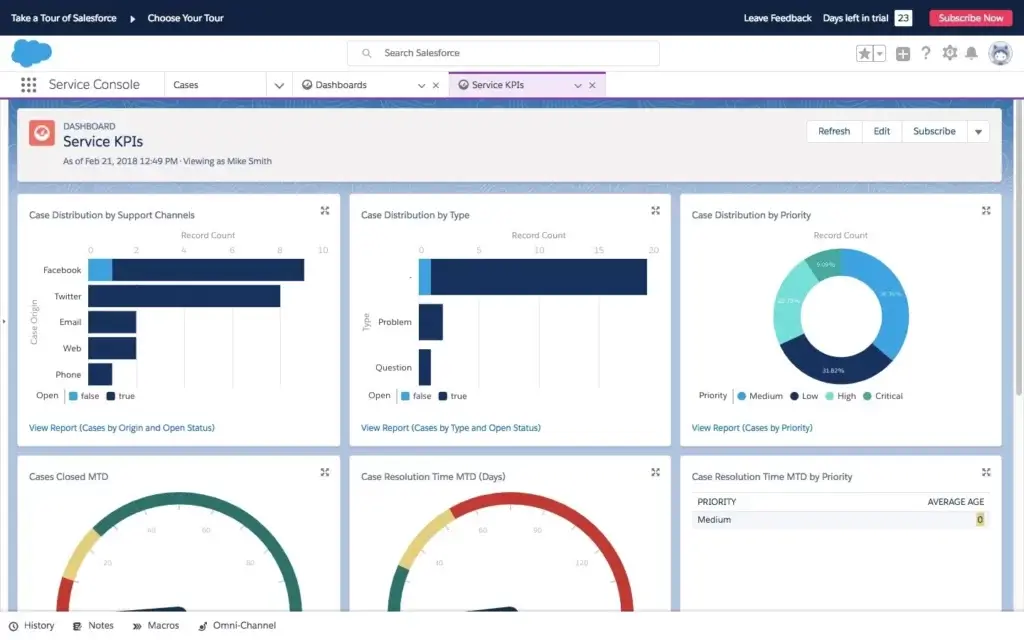
Since both Customer Service and Service Cloud are leading customer service solutions, there is a significant overlap in their features and functionalities. For starters, both solutions offer automation and streamlining of customer interactions and service delivery through multiple engagement channels. They also centralise customer interaction data for personalised customer service through unified reporting and analytics.
The similarities between these Salesforce and Dynamics 365 solutions extend to knowledge management, self-service customer portals, and case and contact management. Other parallel capabilities include AI- assistant for service agents, social customer service, incident routing for faster customer support, and interactive dashboards and reports.
Where they differ is the way they manage customer data. While Salesforce Service has an agent console, which is a unified platform for customer data storage, Dynamics 365 Customer Service uses Azure Online Services like other Dynamics 365 and Microsoft 365 applications. Microsoft invests significantly in Azure each year to ensure improved accessibility in a secure environment. Additionally, Salesforce offers direct and 24/7 live support for Services Cloud customers, whereas Customer Service customers need to rely on support services from Microsoft partners like Dogma.
We provide a comprehensive comparison of many competing business solutions to help businesses pick the right solution. Do you need a detailed comparison between Salesforce Service Cloud and Microsoft Customer Service? We can help!
3. Integration Capabilities
Integration greatly improves the functionalities of business solutions. On one hand, it connects disparate systems to tear down departmental silos, streamlining data sharing and automating processes. On the other, it fosters collaboration and expedited decision-making, saving both time and costs and driving outcomes.
So, when it comes to integrations, Salesforce offers over 3,000 apps in its AppExchange, that enable Service Cloud customers to easily integrate with several third-party applications. The latest ones include Slack for improved collaboration and Tableau for better analytics and data visualisations. Additionally, Service Cloud also has easy integrations with Salesforce Sales and Marketing Cloud solutions and Google Apps. It also offers omnichannel integrations, like computer telephony integration and social channel integrations with Facebook Messenger and text messages.
Dynamics 365 Customer Service also offers a ton of integrations, but they are more focused on other Dynamics 365 and Microsoft 365 systems. And why not? It has native integrations with Microsoft’s robust customer management and enterprise resource planning solutions, like Sales, Marketing, Commerce, Business Central, and Finance and Operations, on top of specialised Power BI, a leading business intelligence application, and PowerApps, a powerful low-code app development tool. Plus, integration with Word, Excel, PowerPoint, OneDrive, OneNote, SharePoint, Outlook, and Teams also greatly benefits Customer Service users with efficient and collaborative workflows. What’s more, it also connects easily with the popular e-commerce site, Magneto, LinkedIn, and Shopify.
In addition to all that, Microsoft has AppSource, which has thousands of business applications and services designed by leading software providers for Dynamics 365, Azure, Microsoft 365, Power BI, and Power Apps. It also includes a catalogue of consulting services and previews of Microsoft partners, allowing you to quickly deploy the app you need and extend the functionality of your solution.
What this means is businesses can get more return on their existing Microsoft investments by choosing Dynamics 365 Customer Service over Salesforce Service Cloud. They can leverage the familiar user experience and unified data management and reporting.
However, it supports fewer third-party integrations as compared to Salesforce. So, if your business uses multiple non-Microsoft apps or connectors, you might want to rethink going for Customer Service. That said, you ought to account for the fact that Salesforce requires an external connector to integrate with, for instance, your ERP system. Now, if you are using multiple systems and applications, the costs for these Salesforce integrations can easily escalate.
So, it really boils down to this: You also need to account for integration costs when deciding between Dynamics 365 Customer Service and Salesforce Service Cloud. The idea is to keep bespoke and third-party integrations to a minimum because they increase the total cost of ownership of your solution.
You can easily avoid unnecessary integration costs by partnering with Dogma Group. Our product-agnostic fit-gap analysis allows you to compare both solutions side by side and evaluate how each one supports your customer service processes. This eases your decision-making by uncovering the integration areas where basic configurations and native APIs will suffice so that you only have to invest in the external connectors that you absolutely need. Talk to our experts to learn more about our fit-gap analysis and advice on system selection.
4. Customisation and Configuration
When it comes to business technology, one size doesn’t fit all. Businesses may have unique system requirements based on their industry and business model. That’s why they often require bespoke solutions whether they are using Customer Service or Service Cloud.
From basic system configurations, like tailored forms and records, to customising complex business rules and triggers for automated workflows, like approvals and analytics, both systems deliver flexible customisation options.
But Salesforce Service Cloud offers more flexibility for customisation than Dynamics 365 Customer Service. However, it’s geared more towards enhancing your CRM capabilities. Tailoring Salesforce Service Cloud to meet ERP, HRM, or any other non-CRM needs typically costs a fortune.
On the contrary, Dynamics 365 Customer Service offers more pre-built templates, workflows, and dashboards that can be configured easily to fit specific business needs, avoiding costly system customisations.
5. Artificial Intelligence
This could be one of the decisive factors that sets apart Dynamics 365 Customer Service from Salesforce Service Cloud. Although both solutions have AI capabilities—Dynamics 365 with its Copilot and Salesforce with its Einstein, Microsoft may very well win the race for enabling an AI-powered workplace.
While both AI models seek to drive workforce productivity with intelligent assistance for agents, Microsoft Copilot based on OpenAI exploits more complex Large Language Models to provide accurate, relevant, and contextual input compared to Einstein.
Copilot for Dynamics 365 is already available for preview, offering specific AI-powered insights, content, and recommendations to expedite workflows. Learn more about Copilot for Customer Service here.
6. User Interface
Salesforce Service Cloud comes with a web-based user interface, and so does Dynamics 365 Customer Service. This allows users of both systems easy remote accessibility.
Salesforce has a simplified, modern interface that lets users navigate by clicking the links on the side. Its agent workspace offers service agents a customisable platform that they can personalise. The Service Console is more of a unified command centre that allows agents to handle several contacts and cases without losing focus. Service Cloud is also equipped with knowledge management, AI, and service analytics—all of which make it a very easy-to-use system.
Compared to Service Cloud, Dynamics 365 Customer Service offers Microsoft’s Unified Interface for all Dynamics 365 products. What that means is you have a metadata-driven user interface that provides a consistent user experience across all devices and browsers. It features interactive dashboards and charts for service analytics, swift navigation with personalised menu buttons, a reference panel, and a search console. Plus, it also offers knowledge resources and AI Copilot for better productivity and efficiency.
Although both systems offer rich user experiences with intuitive layouts, the easy searchability and consistent experience across all Microsoft 365 and Dynamics 365 applications provide Microsoft Customer Service a little edge over Salesforce Service Cloud. This enables seamless data connectivity across all Microsoft software, and with an enhanced AI like Copilot, the user experience gets even richer.
7. Pricing
The choice between Salesforce Service Cloud and Dynamics 365 Customer Service ultimately boils down to their cost of implementation. The pricing for both systems can be complex since each one offers more than one licensing level. Also, there are several Salesforce and Dynamics 365 modules and add-ons that cost more.
Microsoft offers two iterations of Dynamics 365 Customer Service: Professional and Enterprise. Customer Service Professional starts at £41.10 per user per month, while Dynamics 365 Customer Service Enterprise costs £78.10 per user per month. The Professional version is for smaller businesses with limited customer service needs and lacks features like embedded intelligence for context-driven suggestions, a unified service desk, analytics and KPI reporting, multisession support, portals and unified routing. The Enterprise version has all of that and more add-ons like Digital Messaging, Voice, and Chat that further extend the functionality of the system.
Likewise, Salesforce has four iterations of Service Cloud: Essentials, Service Professional, Enterprise, and Unlimited. Service Cloud Essentials is for small businesses with up to 10 users and starts at £ 20 per user per month. To support teams of any size, there is Service Professional with standard CRM features, which costs £ 60 per user per month. For those who want a more customisable CRM for comprehensive service delivery, Salesforce offers Service Cloud Enterprise, which happens to be the most popular one starting at £ 120 per user per month. But for large organisations with complex global operations, there is Unlimited version of Service Cloud, which costs £ 240 per user per month and comes with unlimited CRM capabilities.
Comparing the licensing models and offerings of each solution, it is easy to understand that Dynamics 365 Customer Service offers a less complicated pricing structure. Although it has a higher entry starting price than Salesforce Service Cloud, Microsoft offers attractive discounts with the bundling of Dynamics 365 additional solutions and add-ons. On the contrary, the pricing of Service Cloud doubles for each higher-tier version meaning smaller businesses may find it costly to scale as they grow.
What’s the Verdict?
It is tough to say based on these fine differences alone. Each organisation is unique and has its distinct customer service needs, which is the ultimate determinant of what the final solution looks like. However, always consider these few factors:
- Systems you already have: If you are already using Microsoft 365 and Dynamics 365 applications at your business, you will greatly benefit from investing in Dynamics 365 Customer Service.
- Pricing: If you are looking for affordable scalability, Customer Service is the way forward. But if you’re a medium or large enterprise with steady growth and abundant financial resources, Salesforce may also be a choice.
- Customisation and Configuration: If you have several customisation needs, you may want to opt for Service Cloud as it offers better customisability as compared to Customer Service. Dynamics 365 solutions focus on easy system configurations to avoid costly coding-based customisation to help organisations take full benefits of their solutions at low ownership cost. So, remember that as well!
Besides these factors, the common practice is to partner with Salesforce and Microsoft implementation experts like Dogma. We are Microsoft Gold Partners and Salesforce Elite Partners with several years of experience implementing both solutions for many happy customers.
We follow a product-agnostic approach that allows us to understand your unique needs and processes and work with you to implement only the best-fit solution for your organisation. We also provide easy configurations and customisations with change management and 24/7 support services to help your organisation embrace its digital imperative.

